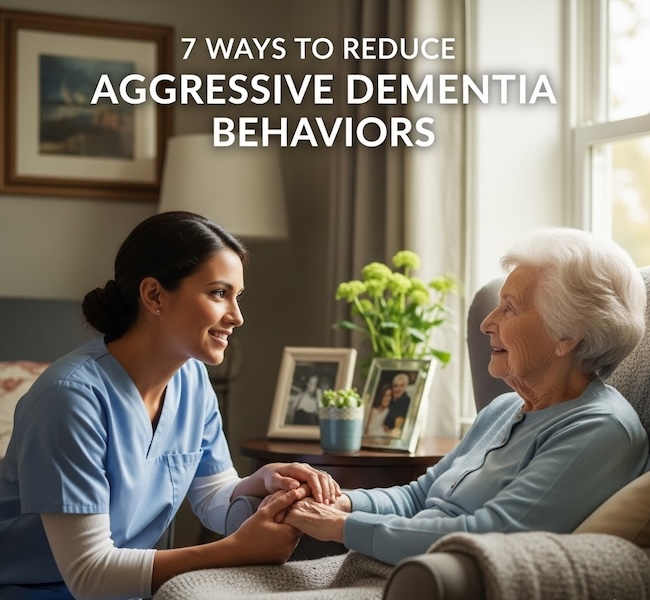Few experiences in dementia caregiving are as shocking and heartbreaking as when a loved one becomes aggressive. A sudden shout, a thrown object, or a physical lash-out can leave you feeling frightened, hurt, and utterly lost.
It's crucial to remember in these raw moments that this aggression is not a personal attack. It is a desperate form of communication – a reaction to overwhelming fear, confusion, or an unmet need that they can no longer express.

While you cannot stop the disease, you can learn to decode these behaviors and respond in ways that de-escalate tension, reduce their frequency, and protect the well-being of everyone involved.
Preparation Can Reduce Aggressive Dementia Behavior and Increase Safety
Alzheimer’s disease and dementia can cause aggressive behavior, even in people who have never been violent in their lives.
These aggressive dementia behaviors can be scary and difficult for caregivers to handle. Older adults could scream, curse, bite, grab, hit, kick, push, or throw things.
It’s important to remind yourself that they’re not behaving this way on purpose or to be hurtful. The brain damage caused by dementia is the reason behind these actions.
No solution can prevent every angry outburst, but there are effective ways to minimize upset, reduce your stress, and increase everyone's safety.
We share seven ways to reduce and prepare for these aggressive dementia episodes.
7 Ways to Prepare for Aggressive Dementia Behaviors
1. Notice signs of an upcoming outburst
Sometimes, but not always, there are indications that an aggressive outburst is approaching.
Minor outbursts, heightened confusion, agitation, anger, and frustration could be signs that things aren’t quite right. Often, since you know them so well, you might feel that something is “off” with them.
When you sense a storm may be approaching, try heading it off by switching to a soothing activity they enjoy, calming the environment, giving them a snack or drink they love, or providing extra comfort and support.
But it’s also possible that an aggressive episode could come out of the blue, so don’t always count on having a warning.
2. Stick to a regular daily routine
To minimize unexpected and stressful events, create and stick to a regular daily routine for your older adult.
With dementia, they’re losing control over their cognitive and physical abilities, along with their independence. That means their lives are filled with more and more unknowns.
If your loved one's days are unstructured and unpredictable, life can become even more stressful – and stress contributes to the anger and anxiety behind aggressive dementia behaviors.
3. Create a calm living environment
For someone with dementia, a calm and relaxing environment helps minimize confusion and agitation.
It also helps them feel calm and able to concentrate on essential daily tasks.
When the environment is distracting or makes it difficult to complete basic tasks, it increases the older adult’s frustration and agitation. That can trigger or contribute to an angry outburst.
4. Be mindful of nonverbal communication
Often, the nonverbal messages we send with our body language and facial expressions come through more clearly than the words we speak.
Using body language and facial expressions that help your older adult clearly and easily understand your meaning can reduce confusion, agitation, and anger, and increase cooperation with essential tasks.
VIDEO: Reducing Aggressive Dementia Behaviors
5. Important – Get rid of all potential weapons
To keep everyone safe, it’s essential to remove all potential weapons. This goes beyond obvious items like guns, knives, and sharp objects.
Also think of regular household implements that could be used as weapons – heavy rolling pins, scissors, fire extinguishers, matches and lighters, glass bottles, or screwdrivers and other tools.
For example, your older adult could have a hallucination or delusion that someone was breaking into the house or mistake you for a burglar.
If that happened, they could unintentionally attack you with a weapon with the good intention of protecting you, themselves, or other family members.
It's a good idea to inventory anything that could be considered a weapon. Firearms in the home are an obvious concern. An NPR piece titled “Firearms And Dementia: How Do You Convince A Loved One To Give Up Their Guns?” sheds some light on the statistics about aging adults and gun ownership:
Researchers also estimate that nearly half of people over 65 either own a gun or live in a household with someone who does. Given those statistics, people who work with dementia patients are trying to raise awareness and make gun safety a top priority for families. – NPR
6. Create a safe place for yourself
In some cases, the best thing to do is remove yourself from an aggressive situation and wait until an older adult calms down or forgets that they’re upset.
That means having a safe place where you can get away from an angry older adult, such as a fully secured room or a clear path to the outside. You’ll also need a plan for when the situation gets out of hand.
For example, keep a phone and additional security tools in the safe room to prevent the door from being opened, like a doorstop wedge or a security bar to jam against the doorknob.
Knowing that you have a plan to fall back on reduces stress and helps you stay safe.
7. Prepare emergency responders to keep things from escalating
Do your best to prevent a situation where emergency responders like police, fire, and EMTs mistake an older adult’s aggressive dementia behavior for intentional aggression and threats.
They could respond with force, which would make the situation worse and could result in injuries, jail, or an involuntary psychiatric hospitalization.
When you’re not in an emergency, call the non-emergency number for police, fire, and other emergency responders.
Ask if they can place a prominent “flag” or notification on your address or phone number to let responders know that your older adult has dementia and how they could best de-escalate an aggressive situation or provide protection for all involved.
If your area’s emergency responders use a service like Smart911, sign up to add this essential personal information to your address or phone number.
Final Thoughts About Aggressive Dementia Behavior
Navigating aggression requires immense patience and a profound shift in perspective, from seeing a challenging behavior to understanding a distressed individual. These strategies are your toolkit for creating a calmer, safer environment, but they are also a form of self-protection, helping to shield you from the emotional toll.
Remember, your calm is their calm. On the most challenging days, remind yourself that you are responding to the disease, not the person you've always known. You are their anchor in a world of increasingly frightening moments. Efforts to understand and prepare are the ultimate acts of compassionate care.
Recommended for you:
- How to Understand and Manage Dementia Behaviors: A Comprehensive Guide
- 10 Ways to Respond to Dementia Hallucinations in Seniors
- 8 Ways to Deal with False Dementia Accusations
This article contains some affiliate links. We never link to products or services for the sole purpose of making a commission. For more information, see How We Make Money.
About the Author

Connie is the founder of DailyCaring.com and was a hands-on caregiver for her grandmother for 20 years. (Grandma made it to 101 years old!) She knows how challenging, overwhelming, and all-consuming caring for an older adult can be. She also understands the importance of support, especially in the form of practical solutions, valuable resources, and self-care tips.














My mom gets angry when I change her diaper. She already started hitting my arm so I don’t touch her. She has dementia.
It can be challenging to help someone with dementia with personal care tasks. Sometimes they might feel like someone is invading their privacy or personal space.
A resource for this that we often recommend are Teepa Snow’s videos, she’s an expert dementia educator. This video addresses hygiene and bathing and will give you helpful info and actionable tips – https://www.youtube.com/watch?v=mIqmdXgVGOw
The video starts with bathing, but the opening tips on getting them into the bathroom and the general techniques that Teepa uses are very useful for helping someone accept assistance with a variety of personal care tasks.
Very interesting
So glad this article is helpful!